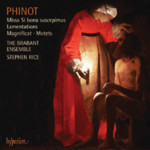
Missa Si bona suscepimus
 $45.00
Special Order
$45.00
Special Order3 - 6 weeks add to cart
PHINOT
Missa Si bona suscepimus
Brabant Ensemble / Stephen Rice
[ Hyperion / CD ]
Release Date: Tuesday 1 September 2009
This item is only available to us via Special Order. We should be able to get it to you in 3 - 6 weeks from when you order it.
"The Brabant Ensemble's performances of these fascinating works are as polished and assured as we have come to expect, full-throated yet finely modelled and shimmering with lively intelligence." International Record Review
"The Brabant Ensemble's performances of these fascinating works are as polished and assured as we have come to expect, full-throated yet finely modelled and shimmering with lively intelligence. Rice unerringly finds the right pace for each work … and pays full heed to Phinot's expressive use of contrasting textures. Amidst all the drama of the larger works, the ensemble's caressing, translucent rendition of O sacrum convivium is a particular high point. This is a valuable and engrossing premiere for a neglected and somewhat unconventional sixteenth-century master" International Record Review
The young Oxford choir turns its immaculate ensemble, lucid diction and faultless tuning to an exciting find: a hugely neglected composer from the 16th century. Relatively little is known about Dominique Phinot's life-there is a suggestion that he was executed for homosexual practices, cutting short a productive and impressive composing career. Phinot's output consists of over a hundred motets, two Masses, and settings of Vesper Psalms and the Magnificat, as well as two books of French chansons and two Italian madrigals.
The acclaim with which his sacred compositions were received is evident both in the frequency of their publication as well as in the writings of his contemporaries. He was clearly renowned as a master of imitative polyphonic writing. The publication in Lyons during 1547/8 of two collections of Phinot's motets secured his reputation for the rest of the century and beyond. Not only do the five-voice motets in the Liber primus mutetarum confirm his outstanding polyphonic skills but the Liber secundus contains five eight-voice works which are of considerable historical importance. The latter are unique in the mid-sixteenth century in their treatment of double-choir dialogue, a technique in which two four-part ensembles normally alternate thematically related phrases of varying lengths. These works, of which four are included in this recording, are the antecedents of the resplendent Venetian polychoral tradition of the late sixteenth and early seventeenth centuries.
Tracks:
Si bona suscepimus
Pater peccavi
Missa Si bona suscepimus
Tanto tempore
Iam non dicam vos servos
O sacrum convivium
Incipit oratio Jeremiae prophetae
Magnificat octavi toni
fitebor tibi, Domine


